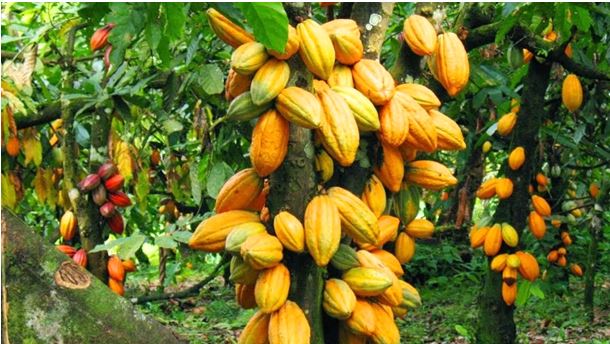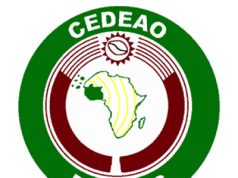By Joshua Worlasi AMLANU
Ghana’s cocoa sector is set to receive a significant boost in the coming years, with rehabilitated farms projected to add over 200,000 metric tonnes to the nation’s annual cocoa production.
This development was highlighted by Chief Executive Officer-Ghana Cocoa Board (COCOBOD) Mr. Joseph Boahen Aidoo, during a press briefing on Tuesday, August 20.
In his address, Aidoo revealed that COCOBOD expects to harvest 650,000 metric tonnes of cocoa this season, which is a notable decrease from the initial forecast of 810,000 metric tonnes. He attributed the shortfall to unfavourable weather conditions in the southwestern part of the country. This situation reflects broader challenges faced by the sector, particularly in adapting to climate variability.
Despite these setbacks, COCOBOD has implemented various measures to tackle the ongoing issues affecting cocoa production, including the Cocoa Rehabilitation Programme. This initiative focuses on replanting diseased and unproductive cocoa farms.
According to Mr. Aidoo, more than 40,000 hectares of cocoa farms have already been successfully rehabilitated and are ready to be handed over to the beneficiary farmers.
“All these farms are fruiting and tens of thousands of additional farms are at various stages of rehabilitation,” he noted.
These rehabilitated farms are expected to play a crucial role in revitalising Ghana’s cocoa industry. The projected increase of over 200,000 metric tonnes to the nation’s annual cocoa output is seen as a significant step toward boosting overall production. This comes at a time when the industry is grappling with impacts of climate change, particularly unpredictable rainfall patterns.
In response to the challenges posed by climate change, COCOBOD has been actively promoting agroforestry practices among cocoa farmers.
Mr. Aidoo explained that integrating trees and crops on the same farm, known as regenerative integrated farming, not only improves soil health and biodiversity but also provides shade for cocoa trees. This method helps mitigate the effects of climate change and contributes to more sustainable farming practices.
Furthermore, COCOBOD has intensified its efforts to promote climate-smart agricultural practices that enhance the resilience and productivity of cocoa farms. A key part of this strategy has been strengthening the board’s extension services.
Mr. Aidoo pointed out that COCOBOD has significantly improved its extension officer-to-farmer ratio from 1,000 officers serving 3,000 farmers to 1,000 officers serving 600 farmers, bringing it closer to the Food and Agriculture Organisation’s recommended ratio.
“These officers play a crucial role in educating farmers on best practices, new technologies and the latest research findings,” Mr. Aidoo emphasised.
The impact of this enhanced support has been evident in improved farming practices and increased productivity observed across the sector.
Mr. Aidoo shared an anecdote about visiting a farm where a single cocoa tree had produced 3,000 fruit – a record attributed to the quality of extension services provided for farmers.
COCOBOD’s commitment to environmental sustainability is further reflected by its involvement in the Cocoa and Forest Initiative, an international effort aimed at ending deforestation and restoring forest areas within cocoa landscapes. This initiative aligns with COCOBOD’s broader goal of promoting sustainable cocoa production and protecting Ghana’s natural resources.
Mr. Aidoo stressed the importance of this initiative in ensuring that Ghanaian cocoa is produced under ethical and sustainable conditions, which is increasingly demanded by global markets.
In line with these sustainability efforts, COCOBOD is also working with international partners to enhance the traceability of cocoa from farm to market. This traceability system is crucial in ensuring that Ghanaian cocoa meets the growing global demand for responsibly sourced products.
“We are meeting the growing global demand for responsibly sourced cocoa and securing premium prices for our farmers through our national cocoa traceability system,” Mr. Aidoo stated, adding that Ghana’s traceability system is the only one of its kind in the world.
COCOBOD’s efforts to improve the livelihoods of cocoa farmers extend beyond production and sustainability. The organisation is actively engaged in international partnerships that promote fair trade and payment of remunerative prices to farmers.
Mr. Aidoo highlighted the Côte d’Ivoire-Ghana Cocoa Initiative as a key example of regional cooperation aimed at ensuring better and more sustainable livelihoods for cocoa farmers.
Annual Syndicated Loan
In a related development, COCOBOD has announced a shift in its financing strategy. After 32 years of relying on offshore syndicated loans to finance its operations, COCOBOD has decided to end this practice.
Mr. Aidoo described this move as a “historic moment for the cocoa industry”, emphasising that COCOBOD has learned valuable lessons over the years and is now ready to finance its cocoa crop locally.
“This marks a transformative change,” Mr. Aidoo stated, explaining that COCOBOD is confident in its ability to self-finance its operations as the new cocoa season begins in September.
Mr. Aidoo noted that this approach will enable COCOBOD to meet its financial obligations more efficiently, as the revenue generated from cocoa sales will directly support the organisation’s operations.















